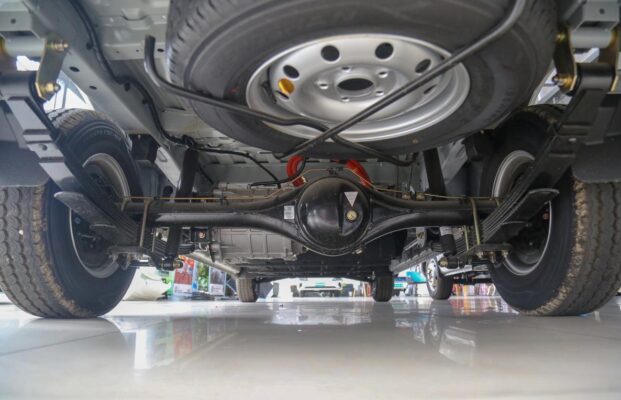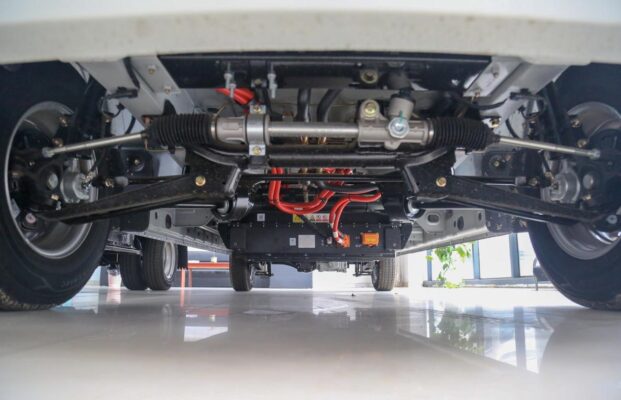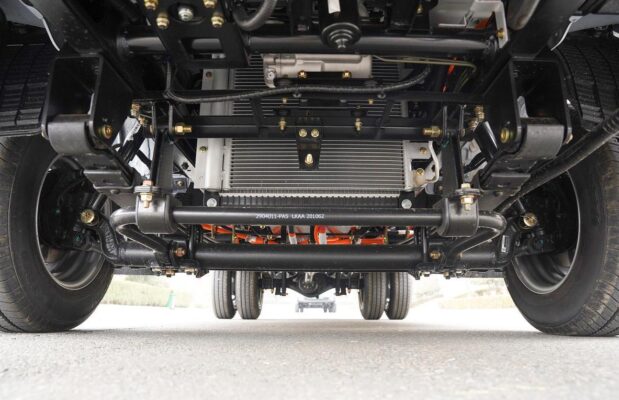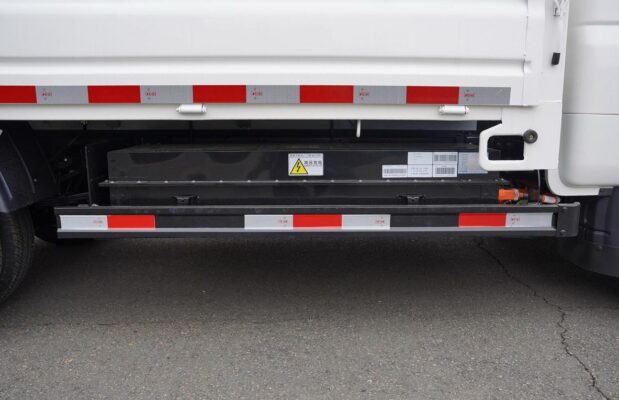Elektriese vragmotor kennis
Analysis of Side-Tipping Accidents of Dump Trucks
Geplaas op deur Elektriese vragmotors
In onlangse jare, as China’s economy has been advancing at a rapid pace, the tempo of infrastructure construction has significantly quickened, and the logistics industry has witnessed an expeditious growth. This has resulted in the large-scale proliferation of domestic heavy vehicles and a further escalation in market demand. Die stortwa, characterized by its high chassis, commendable off-road capabilities, flexible steering, and convenient unloading mechanism, has emerged as an indispensable implement in engineering construction endeavors. Nevertheless, the elevated chassis of the stortwa also implies a higher center of gravity and compromised stability. This necessitates that drivers accord greater emphasis to traffic safety and maintain a steady driving style. Regrettably, the actual scenario often presents us with speeding dump trucks during the nocturnal hours.

The burgeoning number of stortwas has given rise to a gradual upsurge in diverse types of accidents involving them. The principal causes can be categorized as follows: vehicle overloading, an excessively elevated center of gravity, a narrow frame, excessive speed, overly sharp turns, and the like. Byvoorbeeld, during the unloading process of stortwas, the center of gravity frequently undergoes a shift, culminating in the overturning of the entire dump truck compartment – a prevalent form of side-tipping accident in the present times. Beyond the objective factor of the relatively high center of gravity of stortwas, the significant reasons for rollovers also encompass instances where the driver steers too acutely when changing lanes, or the vehicle travels at an excessive velocity when traversing curves and slopes. Such circumstances lead to a sudden loss of control over the center of gravity and subsequently trigger a rollover accident.
In response to the accident circumstances of side-tipping stortwas, the technical department of Hebei Hongchang Tianma Special Vehicle Co., Ltd. has undertaken research and analysis and arrived at the following conclusions and proposed preventive measures:

Investigation and Analysis:
The investigation posits that the primary factors capable of inducing the dumping of stortwas encompass the following aspects:
-
The ground at the dumping site is uneven and features a considerable slope. The terrain at the dumping site must be level, with negligible slope variations. Inadequate leveling efforts can give rise to an uneven surface and pronounced differences, thereby readily precipitating accidents.
-
The ground at the dumping site must not be soft. When the unloading site of the stortwa is situated on a road surface formed by the materials previously dumped by the stortwa, due to the substantial gaps between some materials, there exists compressible space. When encountering heavy loads of the vehicle, as a result of the significant pressure per unit area, local subsidence occurs, inducing a tilt in the contact position between the two drive wheels and the ground. Since the center of gravity of the dump truck escalates with the height of the compartment and the materials within it, a relatively large eccentric moment is generated, causing the entire dump truck to tip over. To address this, we have intensified the technical enhancements of the frame and suspension system, which can more effectively prevent the occurrence of compartment side-tipping accidents.
-
The materials within the compartment are unevenly distributed, and an unbalanced loading phenomenon prevails. At such times, if other factors like vehicle movement come into play, it becomes highly susceptible to causing the vehicle to tip over.
-
Prior to the unloading operation, the driver fails to stringently adhere to the safety operation procedures of the stortwa, namely, the imperative of applying the parking brake before commencing the unloading operation. If the unloading site happens to be on a downhill slope, when the vehicle is undertaking the lifting operation and the materials are in motion, the vehicle may slip. During the slipping process, due to the uneven road surface and the upper shaking caused by the lifted compartment, a side-tipping accident is highly likely to transpire.
-
The line of sight at the unloading site is poor. If the stortwa is conducting the unloading operation near dusk, on account of compromised visibility, if the driver fails to meticulously observe the conditions at the unloading site, it may lead to the selection of an incorrect site for unloading, ultimately culminating in an accident.

Preventive Measures:
Based on the investigation and analysis, we recommend formulating the following preventive measures for stortwas and stortwa unloading operations:
-
Ensure that the vehicle is in optimal technical condition. This encompasses ensuring the firmness and reliability of components such as the lifting cylinder and connection parts, the flatness of the compartment’s bottom plate, and the sensitivity and reliability of the rear self-locking switch. Regular inspections and maintenance should be carried out to identify and rectify any potential issues promptly.
-
When the driver undertakes the material loading operation on the stortwa, it is essential to guarantee uniform loading and strictly prohibit overloading. Overloading not only poses a significant risk to the stability of the vehicle but also places excessive stress on various mechanical components, increasing the likelihood of failure.
-
When the driver selects the unloading site, every effort should be made to opt for a flat and solid surface. A level and stable unloading site reduces the risk of uneven ground-induced tilting and provides a secure foundation for the unloading process.
-
When the driver performs the lifting operation, it is crucial to execute it at an appropriate speed and avoid rapid lifting with a large throttle. Excessive speed during lifting can cause sudden and unmanageable shifts in the center of gravity, increasing the risk of instability and potential rollovers.
-
Regularly employ machinery such as loaders to level and compact the unloading site. This ensures the ground remains consistently firm and level, minimizing the chances of subsidence or unevenness that could lead to accidents.

Verder, it is of paramount importance to provide comprehensive and ongoing training to drivers. This training should encompass not only the technical aspects of operating the stortwa but also emphasize the significance of safety awareness and adherence to operational procedures. Drivers should be well-versed in understanding the vehicle’s capabilities and limitations, as well as being able to anticipate and respond appropriately to potential hazards.
In addition, the implementation of advanced technological solutions can also contribute to preventing side-tipping accidents. Byvoorbeeld, the installation of sensors and monitoring systems that can detect changes in the vehicle’s center of gravity, load distribution, and ground conditions in real-time can provide early warnings to the driver. Such systems can alert the driver when an unsafe condition is approaching, allowing for corrective actions to be taken promptly.

Bowendien, companies and regulatory authorities should establish and enforce strict safety standards and regulations for stortwa operations. Regular inspections and audits of vehicles and unloading sites can ensure compliance with these standards and identify any potential safety deficiencies before they result in accidents.
The safety of stortwa operations is not solely the responsibility of the drivers but also requires the concerted efforts of vehicle manufacturers, transport companies, and regulatory bodies. By implementing a combination of technological advancements, driver training, and strict regulatory measures, we can strive towards minimizing the occurrence of side-tipping accidents and ensuring the safe and efficient operation of stortwas in our infrastructure and logistics endeavors.
It is also worth noting that the design and engineering of stortwas should continuously evolve to incorporate the latest safety features and improvements. This includes optimizing the chassis and suspension systems for better stability, enhancing the braking systems for more effective control, and developing smarter loading and unloading mechanisms that minimize the risk of center of gravity shifts.

In the context of urban development and the ever-increasing demand for transportation and construction activities, the safe operation of stortwas becomes even more critical. A single side-tipping accident can not only cause significant property damage and personal injuries but also disrupt project schedules and have a negative impact on the overall economic and social development.
To sum up, the prevention of side-tipping accidents of stortwas requires a multi-faceted and integrated approach that encompasses technological innovation, human factors, and regulatory oversight. Only through a collective commitment to safety can we ensure the smooth and accident-free operation of these essential vehicles in our modern infrastructure and logistics landscape.